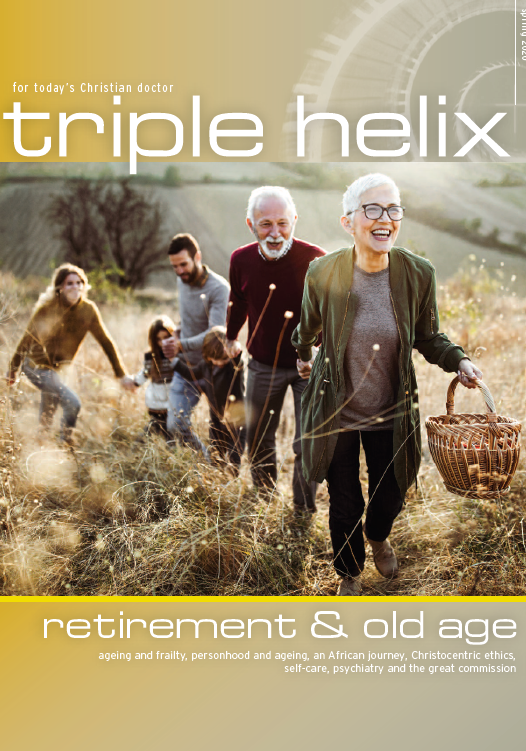So might a book by Jane Austen have begun had she written a novel on either subject. However, while death is inevitable regardless of age, old age is the preserve of fewer, although increasing numbers are now living to celebrate their century. When Prince Phillip retired from public duties at the age of 96, he was asked whether he found it difficult to stand down and replied that he actually found it more difficult to stand up these days. He had the unusual pleasure of inviting his 101-year-old mother-in-law to his 80th birthday party.
Paul Tournier, a Swiss physician and counsellor, said that 'To retire successfully is no easy matter', [1] further adding that it is something that should be 'undertaken not just undergone' [2] and Billy Graham, in his book Nearing Home added 'If I had run my business with as little advanced planning as I gave to my retirement years I would have gone bankrupt'. [3]
When I began as a consultant, my senior colleague took me on one side and said that it is never too early to think about retirement. That was nearly 30 years ago, and the time seems to have flown by. Retirement is a time of readjustment. Loss of work can lead to loss of significance, especially for those for whom it has been an all-absorbing career, and couples who have spent many decades apart during the day living their own lives may find the sudden change difficult. My mother's comment when my father retired was that she took him in her marriage vows 'For better, for worse but not for lunch!' and Kahlil Gibran offers wise advice when he says 'Let there be spaces in your togetherness'. [4]
Often, the years between 60 and 75 can be some of the most profitable times of one's life, as for many health remains good, and one has the experience that comes with the years. Some remain active much later; Titian was still active at 97 painting his 'Descent from the Cross'. While there may be less money, there will be more time. It is good to remember that what we give to God's work is not just financial, but our time, talents and energy (although I know of one senior Christian minister who felt able to give more in retirement as outgoings were much less). Each must decide before God what is right, for we cannot tell others how to spend their money. In retirement, we need to ask if we are going to indulge ourselves all the time or use our retirement to make an impact on the lives of others, revising our priorities and searching prayerfully for fresh inspiration and other ways of service. To that end, it is helpful to reflect on whether we are primarily Christian health professionals or health professional Christians. If the latter, then in retirement only the adjective changes and may be replaced by another.
Old age
In 45 years in medicine, one of my great joys has been in learning about my older patients. William Osler, who ended his life as Regius Professor of Medicine in Oxford, once said 'It is more important to know about the patient who has the disease than the disease that has the patient.' [5] Patients are living history, and it was through some of my elderly patients that I have understood something of the trauma of the mud and trenches of the First World War and the freezing conditions on the Arctic convoys of the Second World War. For ourselves, old age can bring both problems and joys. For many, there is the trauma of loss. For those who are married, the loss of a spouse and possibly even the loss of children is one of the greatest traumas we will face. But whether married or single, the loss of friends will come, although Francis Chavasse, Bishop of Liverpool once reflected that while one of the trials of advanced age is the loss of old friends, one of its compensations is the love of a younger generation. [6]In his last book, The Radical Disciple, John Stott poignantly described his dependency on others and points out that refusal to be dependent on others is not a mark of maturity but of immaturity. God's design for our life is that we should be dependent. We come into this world totally dependent on the love, care and protection of others. We go through a phase of life when others depend on us, and most of us will go out of this world totally dependent on the love and care of others. He goes on to say, pointing to Galatians 6:2: 'I sometimes hear people including Christian people who should know better say, "I don't want to be a burden to anyone else. I'm happy to carry on living as long as I can look after myself, but as soon as I become a burden I would rather die." But this is wrong. We are all designed to be a burden to others. You are designed to be a burden to me and I'm designed to be a burden to you and the life of the family, including the life of the local church family, is of mutual burdensomeness.' [7] And as frailty gradually takes over, we need to hand back to God those gifts and abilities we will not need in the life to come.
Yet there are many positives about growing older. Billy Graham said: 'Don't resent growing old. Many are denied the privilege. Remembering what God has done for you invigorates old-age. It is not how weak we are, but how strong He is. Forget not the anchors that stabilized, the lighthouse that directed, and the Word of God that calmed the treacherous waters.' [8]
The Bible is full of examples of men and women who were active in their old age, and a biblical study of old age is a fruitful occupation. Abraham at 75 set out from Ur on a journey in faith, not knowing where he was going, not knowing what he would find, but knowing in whom he trusted. [9] Moses spent 40 years training as a shepherd for his father-in-law before taking up his final vocation at 80, shepherding God's people to the Promised Land. [10] Naomi found comfort in caring for King David's grandfather when he was a baby [11] while Simeon and Anna discovered their life's fulfilment in their old age as they held the Messiah in their arms. [12] All of us can find comfort in God's words through Isaiah to Israel: 'Even to your old age and grey hairs, I am he, I am he who will sustain you. I have made you and I will carry you; I will sustain you and I will rescue you.' [13]
Rev Tom Smail who died in 2012 and spent his final years in a nursing home with John Stott, reflected on the fact that while Christ shared many aspects of our earthly life, he never experienced old age. Yet in his meditations, he felt that Jesus did grow old in Gethsemane. [14]
Bernard of Clairvaux suggested the same in the words of the hymn attributed to him 'O sacred head sore wounded'.
'Death's shadows rise before you, the glow of life decays;
yet angel-hosts adore you, and tremble as they gaze.
Your youthfulness and vigour
Are spent, your strength is gone,
and in your tortured figure I see death drawing on.
What agony of dying! What love to sinners free!
My Lord all grace supplying,
O turn your face on me.'
Rev Alec Motyer and John Stott were both active well into their 80s. In 2007 they shared the platform at the Keswick Convention for the last time with Alec Motyer writing: 'It is a fact. Never in the history of the Keswick Convention have two speakers enjoyed a combined age of 168 years! My elderly eyes were blind with tears as I watched my beloved friend make his slow way to the platform, marked his resolute stance at the lectern, and thanked God with the thousands present for the best evening meeting of the week. And now we both turn, to what Charles Simeon described as "running with all our might now that the winning post is in sight". Running! My Zimmer frame trails far behind his, I fear, but I long with all my heart to be identified, however feebly, with his legacy. To know, love, read, study and proclaim the Word of God as long as the Lord gives life and his grace gives strength.' [15]
May this be our prayer too, as the evening draws on, the shadows lengthen, and we look towards an eternal future. And while as a Christian we should not fear death, for many there is an understandable apprehension about the process of dying. But Christ has gone before, and as Aslan says to Lucy in the Voyage of the Dawn Treader: 'I will not tell you how long or how short the way will be; only that it lies across a river. But do not fear that for I am the great Bridge Builder.' [16]
David Cranston is Associate Professor of Surgery at the University of Oxford and an Honorary Consultant Urological Surgeon at the Oxford University Hospitals Foundation Trust.
































